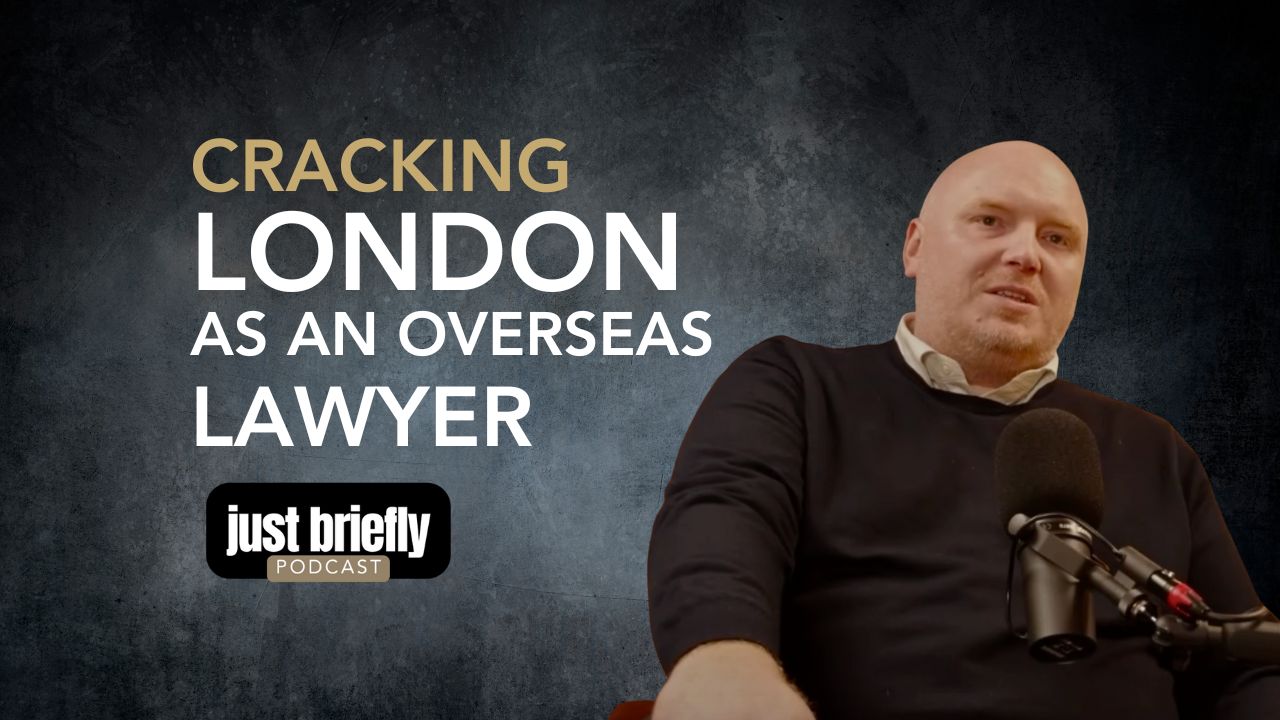UK vs US - The Differences in Legal Recruitment & Which is Better: London or NY?

As a global agency, we get the opportunity to compare and contrast the legal recruitment market in multiple jurisdictions. With different firms, cultural norms, and approaches to work, it can be quite confusing if you’re looking to relocate to two of the most well-trodden paths. One of the questions we’re often asked by international Associates is: Is the US or UK better? And what are the differences? Each offer their own unique benefits.
Recently we sat down with Stefano Barbagallo (Associate Director in New York) and Tito Ayantunde (Consultant in London) to discuss the differences between the London and New York legal recruitment markets, with a focus on top level firms. They answer some common questions about the two, including the question that’s on everyone’s mind – which is better: London or New York?
What are the benefits of using a recruiter in the US/UK market – and should I use one?
TA: Whether you’re a local candidate, and even more so if you’re a foreign qualified candidate, you can’t have the same relationships and knowledge of the market as a recruiter. Our job is to take the stress and confusion out of the process, open doors, and provide lawyers with the information that they need to make the best decision for their career. It is always in a lawyer’s interest to find and work with a recruiter that they trust.
SB: Well said, Tito. I could write an essay on this but that's probably the exact reason why people don't want to use recruiters. Find a good one and the benefits are endless. They should have direct access to the team, have strong working knowledge of the industry and your specific practice and have a strategy in play to help you leverage your skillset in the market. You'll know from the first call if you're dealing with someone worth your time. You absolutely need to use one for an international move.
If I relocate to the US/UK, do I need to requalify?
TA: Luckily for many you’re not forced to requalify in order to practice in the UK, and many successful lawyers never do, but doing so can only increase your prospects. There’s primarily a much stronger focus placed on having the relevant experience i.e. practicing under UK, and sometimes EU, laws and regulations.
SB: Associates will generally need to be qualified in the State in which they're practising. For US lateral Associates this can simply mean motioning in (depending on the State) but for international associates, unfortunately this means sitting the relevant State Bar. You will need to have your law school transcripts assessed months in advance and we are generally seeing employment offers remain subject to you passing the Bar.
What do interview processes look like?
TA: Depending on the firm, and even the team, you’ll usually find yourself going through 3-4 interview stages with Partners over about a month. Most of these interviews will be conducted online with the final usually being in person. An Associate round can come in at the end, either just before or after an offer is made.
SB: Most Associates will be surprised that interviews are fairly informal and focus largely on cultural fit (both for you and for the team). Like London, 3-4 interviews can take place over weeks, sometimes even days, and you'll get the opportunity to meet Partners & Associates across the team.
Can I retool/change practice area?
TA: ‘Retooling’ is extremely uncommon in the UK, particularly at the top level. Preference will always be for a lawyer that already has experience in the relevant practice area. There is, however, the option to further specialise your practice at the right firm e.g. focusing on international arbitration work as opposed to a mix of dispute resolution.
SB: It’s much the same in the US, however there are some caveats to this and I'm happy to chat about these individually as they do work on a case by case basis. Similar to the UK, you do see some Associates sidestepping into a complementary practice area (for example, from Restructuring into special situations, from private funds into secondaries and across finance also).
What’s the culture like with regard to remote working?
TA: 100% remote working is just not a thing for Associates in the UK. COVID did help to introduce hybrid working, however, and most firms are now happy for Associates to only spend 50-60% of their days in the office. Be aware though as there are a handful of US firms that have moved to specifying a minimum of 4 days in a week.
SB: Remote working really is such a one-off. While some will argue that even hybrid is on the way out, I think most firms are heading towards 4 days in the office. The reality is, firms treat you like adults – when you're working hard, you will likely be working from home a couple of days a week.
Are the teams more specialised or more general practices?
TA: Whether you join a more specialised or generalist team is very much dependent on the firm that you join. For example, some firms split their IP team from their IP disputes teams, and some keep them together for a broader practice. Understanding what you want at this stage of your career, and which firms can actually provide that, is key.
SB: US teams are generally quite specialized. It’s rare to see teams like you do in Australia or Canada that have broad corporate or finance teams. In the US, you’ll have private equity teams dealing with just one segment of the market, you’ll have debt finance that just deal with sponsor side.
At which firms can I expect the highest compensation package?
TA: The US firms tend to pay the highest in London. It’s worth noting, however, that not all of them pay the oh so great Cravath rates and even the ones that do use different USD/GBP conversion rates.
SB: *throws hands up in the air* Cravath salaries baby! The salaries in US at the elite firms are all (fortunately) lockstep.
What visa do I need to live and work in the US/UK?
TA: The visa you need to live and work in the UK will depend on that country that you’re emigrating from. Australians, Canadians, and Kiwis tend to look at the Youth Mobility Visa first whereas Americans may consider the UK Skilled Worker Visa. Ultimately, a strong lawyer will be sponsored quite happily by most firms, and they are very accustomed to the relocation process.
SB: Canadians and Australians fare quite well in the US with a non-lottery TN or E3 Visa. Singaporeans also have good prospects with the H1B1, however countries that require H1B Visa sponsorship unfortunately won’t have much luck!
Will my PQE/class year change if I relocate to the US/UK?
TA: Your PQE/class year is at the discretion of the firm that hires you. The most common reason for a deduction is due to the UK’s training contract – this is a 2-year period of, usually, 4 rotations in different teams that a lawyer takes as the main route to qualify in the UK. If you didn’t undergo similar training yourself, you’ll likely be deducted 1-2 years to compensate for less private practice experience.
SB: This is changing in the US. Through the pandemic we saw many internationals come across and not need to take any discount on their year class year, but this is slowly changing back to a 1-2 year discount on any new hire. In some instances, we are also seeing local laterals being asked to take a discount on their class year when they move if they were quiet across the pandemic lull.
I only want to go for live roles - am I missing out on anything?
TA: The short answer is yes. At the top level, a lot of recruitment goes on behind closed doors for opportunities that aren’t ‘live’ or being advertised publicly. Working with the right recruiter will allow you to take advantage of their relationships. This will allow you to apply to the teams that you’re genuinely interested in, not just the ones that happen to have a role open.
SB: Couldn’t have said it better myself, Tito. For the real legal superstars, you’ll find that most Partners will put forward a strong business case to the firm, even if they aren’t hiring, to secure the best talent.
Can I return home after a couple of years?
TA: Ultimately, yes you can – it’s your career and you’re in control. It is, however, important to put yourself in the shoes of a hiring firm. For a firm to invest in you, particularly if they’re aiding in your relocation, they will do so under the assumption that you’re joining them long term. If your plan is to come to the UK for a couple of years and return home, be aware of a relocation fee clawback that will likely be written into your contract.
SB: Similarly across the US, this is a real concern for Partners. Firms spend a lot of money investing in Associates so they do want to see that you’re here for the long term. Obviously circumstances can and do change, and Australian and Canadians returning home are generally greeted with open arms and big salaries.
Is London or New York better for lifestyle?
TA: I think I already know Stefano’s answer here but…both cities can offer you so much and are similar in many ways. If you enjoy pub culture, having travel to continental Europe so easily accessible, and a great mix of both historical and modern cultures, then London just might be the move for you.
SB: London who? It’s New York or nowhere!
To further understand your options as a lawyer in New York or London, reach out to Stefano or Tito for a confidential no-obligation call.






